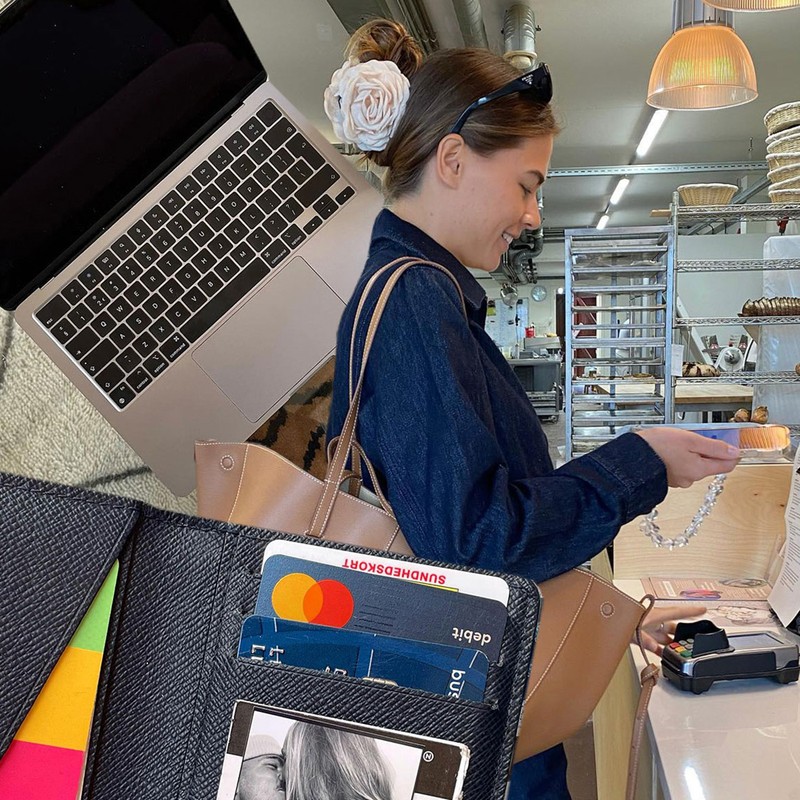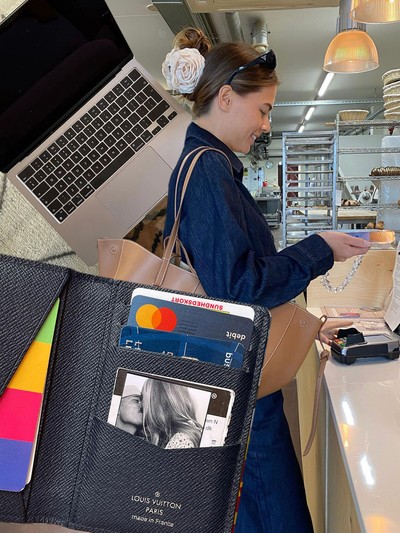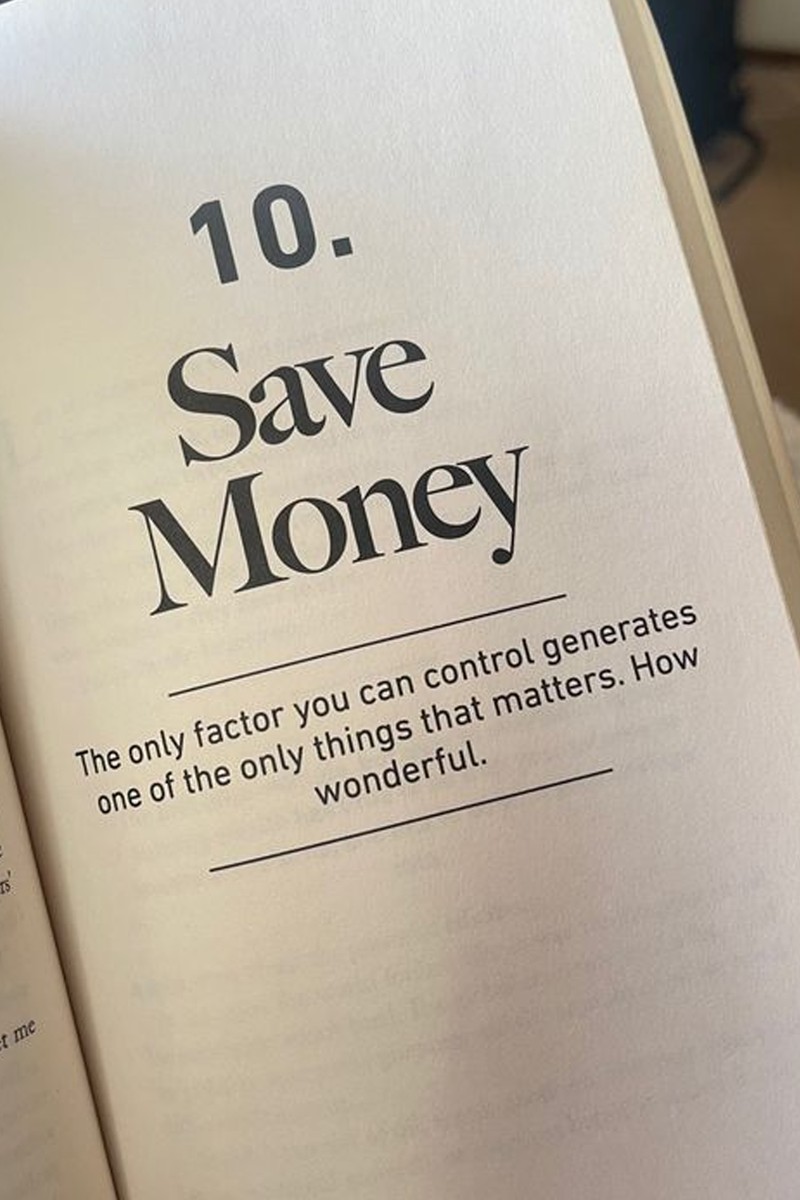

Top Saving Tips For 2024
Start Small
When it comes to saving, it can be hard to know where to start. Ruth Anderson, personal finance expert at Starling Bank, suggests: “If you’re new to saving or don’t have a target in mind, start small and build up the amount as you feel more comfortable. Being too ambitious with saving from day one can set people up to fall short. Just £5 a week may sound small, but you could save up to £260 by the end of the year – that could cover Christmas presents or flights abroad.”
Sammie Ellard-King, founder of Up the Gains, recommends automated saving tools: “Round up features by banking apps like Monzo or Moneybox are great ways to ease into saving. They allow you to build up money without really noticing, and even earn interest on your savings.”
Follow The 50/30/20 Rule
You may have heard this advice before, whether through parents, friends or TikTok. Truth is, it’s solid – and all of our experts agree. Anita Naik, savings expert at VoucherCodes.co.uk, explains: “You set aside 50% of your income for necessities, 30% for ‘wants’, and 20% to put into your savings or pay off any outstanding debts. Your needs are defined as your expenses which must be met – for example, rent, food, travel to college or work, or a phone bill. Your wants are the items you spend money on by choice, such as new trainers or streaming subscriptions.”
Sammie recommends the Snoop app to create budgets: “It’s a brilliant free app. Otherwise look for free budgeting templates and calculators online or just do an old-fashioned list with a calculator. Find what works for you and stick with it. Ideally, you want to create a budget the week before payday so you’re ready with a plan when it comes.”
Analyse Your Spending Patterns
Try to keep track of where your money is going, your main expenditures, and your spending triggers (eek). Louise Hill, CEO and co-founder of GoHenry, says: “Establishing your needs vs wants will help you reduce temptations to make unnecessary purchases. This doesn’t have to be an all-or-nothing approach, but take the time to think about whether you really need that one luxury item. Could you swap it for a cheaper or free alternative like at-home movie nights or a homemade ‘fake-away’?”
Ruth agrees: “If you’re someone who struggles with impulse or emotional spending, particularly on the non-essentials, try to implement a rule that if you want something, think about it for 48 hours. If the time has passed and you don’t want it anymore, that’s money saved! You could also analyse your spending month on month, and see if there are categories that you overspend on. Some banks offer spending analytics tools, so you can assess whether impulse takeaways or clothing hauls are dampening your efforts to save.”
Subscriptions are one of the biggest issues, says Anna-Sophie Hartvigsen, co-founder of Female Invest: “You must cancel unused subscriptions or memberships. Consider cheaper alternatives for entertainment, negotiate your bills and look for discounts on utilities or services.” Sammie adds: “TV subscriptions are the biggest, but also watch out for things like premium versions of gaming apps and creator apps like CapCut.” So, do you really need Netflix, Apple TV, Amazon Prime and NOW?
Switch To A High-Interest Savings Account
One of the simplest ways to maximise your savings it to take advantage of the high interest rates and put your money into the right savings account. Financial expert Sam Leach explains: “Look at websites like Money Saving Expert or Go Compare to compare banks and accounts with the best interest rates. Some banks offer high interest rates for regular monthly savings, usually with a cap on the maximum monthly deposit. Right now, Monzo Instant Access offers an interest rate of 4.6% which is good, while Metro Bank offers 5.22% for a year, after which the rate will go down, so set yourself a reminder to switch before that happens.”
Consider Switching Your Current Account Too
Most of us have had our current accounts for years, mainly because we don’t know where to start when it comes to looking for a new one. Ruth says: “If you don’t feel like the one you have is serving you and your needs, consider switching. It’s important to do your research (tools like MoneySupermarket.com are good) on what you’d actually get with your potential new bank and if it helps you manage your money. Don’t just be attracted by switching offers and free cash. A cash incentive is a short-term gain, but with bank accounts it’s important to consider the long-term possibilities such as saving rates, overdraft options, or tools that can help you with tasks like budgeting.”
Just be strategic, says Ruth: “Switching bank accounts too often can affect your credit score. Lenders will want to understand how trustworthy someone is before they lend them money or approve them for a bank account with an overdraft.” Anna-Sophie sums up: “For young savers, consider banks that offer high-yield savings accounts with no minimum balance and low fees.”
But what else is on offer? Anita explains: “Many banks will offer Lifetime ISAs which are designed to help you save for the future or buy a home. If you are aged 18 to 40, you can add up to £4,000 a year into one of these accounts until the age of 50. In return, you’d qualify for an annual 25% government bonus up to a maximum of £1,000.”
Be Wary of ‘Free Money’
There are some great cashback schemes out there, says Sammie. “TopCashback and QuidCo are the two largest cashback sites in the UK. They have over 5,000 retailers including brands like Amazon, Boots, John Lewis, ASOS and even supermarkets. Cheddar is an excellent newbie, with a range of offers from Trainline to Starbucks, and it connects directly to your bank card, so you don't miss out.”
But be careful, Ruth warns: “The idea of ‘free money’ through cashback schemes might seem really tempting, but it is crucial to not get swept up in spending just for the sake of some extra cash. Before buying something that has a cashback offer, ask yourself, ‘Would I have bought this anyway? And do I actually need it?’”
Stay On Top Of Your Side Hustle
From selling your unwanted clothes on Vinted to freelance work, side hustles are a great way to bolster your savings pot, so long as you’re aware of the new tax rules. Louise explains: “Young entrepreneurs should be aware of the new tax implications, which now require them to declare any earnings over £1,000 to HMRC. Not declaring could result in hefty fines and penalties, so you will need to be clued up.”
Set Yourself Challenges
Let’s face it, saving isn’t the most exciting thing in the world, but our experts even have some tips and tricks to make it a bit more entertaining. “Try the 1p challenge,” suggest Sammie. “You save 1p more every day for 365 days. For example, start by saving 1p on 1st January, then 2p on 2nd January and 3p on 3rd January, and so on. By the end of the year, you’ll have saved £671.61.” Not too shabby.
Anna suggests: “Try a ‘no-spend month’ challenge to break spending habits and focus on essentials only. Another fun one is a ‘DIY month’ where you make things instead of buying them.”
Go The Extra Mile
Knowledge is power and, fortunately, there are lots of resources for gathering more info. Anna advises: “Look at the resources on Female Invest for education on how to invest your money, and browse sites like Mint or YNAB for user-friendly budgeting experiences and tools.”
Louise adds: “GoHenry is committed to providing young people with both the theory (Money Missions) and the practice (app and card) of financial education in one place. Money Missions are fun, in-app lessons tailored for different age groups to accelerate young people’s financial education by teaching them about topics including saving, budgeting, investing, interest, jobs, pay and becoming an entrepreneur.”
Anita says: “Utilise banks’ own tools. For example, Barclays has a LifeSkills programme designed to teach money and career skills as you progress. And, if you’re at university, you can also use its advice and counselling service, as well as sites like Money Helper to assist your budgeting.”
For more information, visit VoucherCodes.co.uk, GoHenry.com, UpTheGains.co.uk, TopCashBack.co.uk, FemaleInvest.com & StarlingBank.com
DISCLAIMER: We endeavour to always credit the correct original source of every image we use. If you think a credit may be incorrect, please contact us at info@sheerluxe.com.



